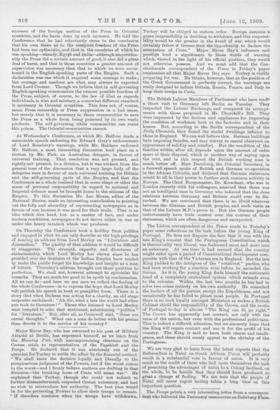On Thursday the Conference took a holiday from politics and
engaged in what we can only describe as the high privilege of hearing an address from Lord Morley on "Literature and Journalism." The quality of that address it would be difficult to exaggerate. The strength, capacity, and directness of statesmanship which Lord Morley has shown since he has presided over the destinies of the Indian Empire have tended tp make the public forget his knowledge and insight as a man of letters. Thursday's address brought out these qualities to perfection. We shall not, however, attempt to epitoiniee his remarks. They are much too good to be spoilt by condensation. All we can do—and here we are sure we reflect the feeling of the whole Conference—is to express the hope that Lord Morley will publish his speech in book or pamphlet form. There is a story that when Dickens was acting for a charity, an old stage carpenter exclaimed : "Ah, Sir, what a loss the world had when you took to literature !" Those who listened to Lord Morley were tempted to echo that sentiment, substituting "politics" for "literature." But, after all, as Cromwell said, "these are carnal thoughts." What can a man do better with his genius than devote it to the Service of his country P










































 Previous page
Previous page